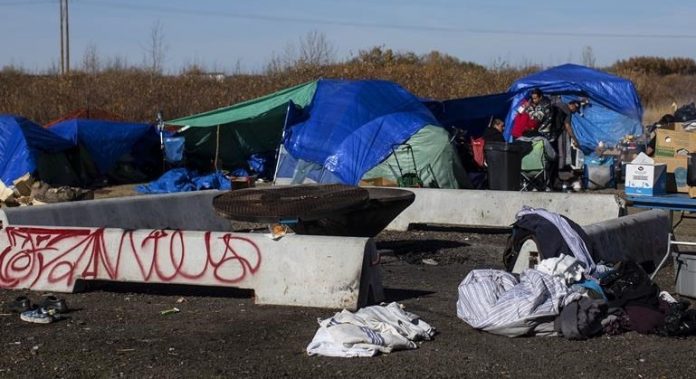Alberta is dedicating $23 million in extra funding to help people experiencing homelessness and domestic violence in the short term, and building a taskforce to come up with solutions for the issue in the long term, officials announced Wednesday.
Premier Jason Kenney and Community and Social Services Minister Jason Luan announced the dollars at the newly rebuilt Herb Jamieson Centre in Edmonton, which opened Oct. 1.
The greatest chunk of the government money will help shelters operate through March 2022: $13 million will flow to emergency homeless shelters, $6.5 million to COVID-19 isolation facilities, and $2 million to emergency women’s shelters.
The shelters are located in Edmonton, Calgary, Red Deer, Grande Prairie, Medicine Hat, Lethbridge, Lloydminster, Drayton Valley, Leduc, Slave Lake and Wetaskiwin.
An additional $1.5 million is being provided to the City of Edmonton to open up to 200 beds at Commonwealth Stadium.
Kenney acknowledged the money won’t target homelessness at its root.
“No, I don’t believe this is sufficient. Today’s announcement is about one immediate, acute, seasonal need that’s driven by the COVID situation,” he told reporters.
“This is what Mayor [Amarjeet] Sohi asked of us, which was to focus on the immediate acute need, because we don’t want people sleeping rough in a cold Edmoton winter.”
The municipal and provincial leaders said their first meeting with Sohi in his new role was underscored by a sense of urgency.
New data suggested Edmonton’s homeless population has doubled since 2019 and reached a seven-year record, as well as the capital city’s first snowstorm of the season earlier in the week. The numbers estimated Edmonton was about 500 beds short as of Oct. 1.
“I’m here to convey my deepest appreciation that within two weeks, premier, you showed up. You delivered what we were asking for,” Sohi told Kenney.
“Governments don’t move as fast, we all know that. But getting this done in two weeks really speaks to the commitment that premier and Minister Luan made.”
A NEED FOR SHELTERS
Kenney rejected any suggestion that emergency shelters are a Band-Aid solution.
“This bandaid has been saving lives for 92 years,” Kenney said, referencing the Herb Jamieson Centre. “There will always be a need, I believe, for emergency shelters for some folks who for one reason or another are not accessing more conventional housing support.”
He continued, “To take high needs, very high needs homeless people, who may have very complex mental health challenges, or very serious addictions problems, simply to put them in a low-cost housing unit is not sufficient. We need to ensure… minimal standards and part of those standards have to be immediate access to relevant social services.”
The official opposition says Wednesday’s announcement does not address the current lack of supportive housing in Alberta.
“Instead of building housing, there is a bill in the legislature right now to allow the government to sell Alberta’s affordable housing stock to the highest bidder,” said Lori Sigurdson, NDP Seniors and Housing critic.
The NDP says the only way to adequately address problems of homelessness and poverty in the province is to build more affordable housing, rather than increasing the number of shelter beds.
“Expanding shelter supply provides temporary relief. However, it is not enough. People deserve homes, not mats,” said Marie Renaud, NDP Community and Social Services critic. “It’s time for the UCP to stop pushing people into poverty and start working with the federal and municipal governments to build affordable housing.”
The taskforce will consist of 16 representatives from Indigenous and business communities and service providers.
Edmonton’s police chief, Dale McFee, and chief administrative officer will co-chair the taskforce.
The group is supposed to come up with solutions that address the needs of residents and community groups and agencies.
The government provided $78 million in similar funding in 2020, on top of budget and capital plan commitments.
Alberta and the federal government each provided $4 million to the Herb Jamieson Centre. Hope Mission fundraised the remaining $8 million. The project took 22 months from demolition to reopening.
































